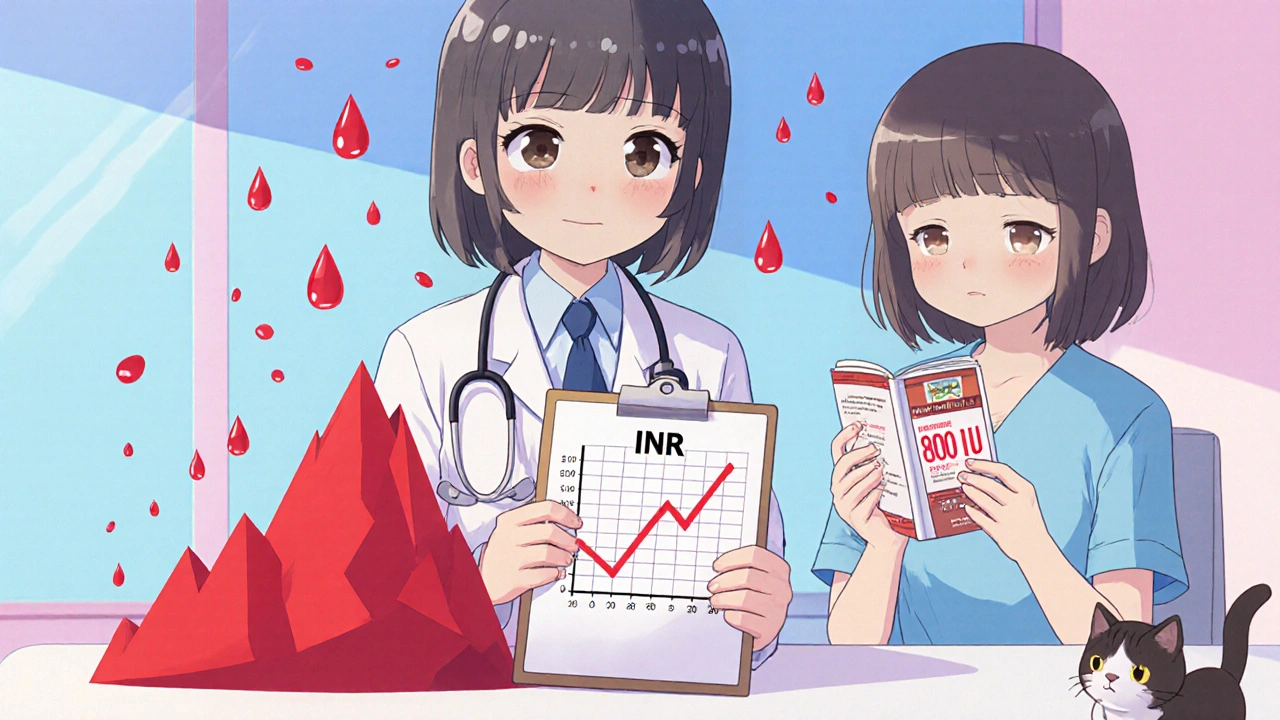Vitamin E & Warfarin Risk Calculator
Vitamin E & Warfarin Interaction Calculator
Determine your bleeding risk based on vitamin E dosage and warfarin treatment. Remember: even low doses of vitamin E can increase bleeding risk when taking warfarin.
Recommended actions:
- Continue regular INR monitoring (as prescribed by your doctor)
- Report any unusual bruising or bleeding to your healthcare provider
- Consider discussing vitamin E use with your anticoagulation specialist
Take vitamin E daily for your skin or heart? If you're also on warfarin, you could be putting yourself at risk for serious bleeding-even if you feel fine. This isn't theoretical. People on warfarin have ended up in the ER with internal bleeding after taking what they thought was a harmless supplement. The truth? Vitamin E doesn't just sit there quietly. It can make warfarin work harder than it should, and the danger doesn't show up right away.
How Vitamin E Interferes with Warfarin
Warfarin works by blocking vitamin K, a nutrient your body needs to make clotting proteins. That’s why it’s so effective at preventing dangerous clots in people with atrial fibrillation, artificial heart valves, or a history of deep vein thrombosis. But vitamin E doesn’t just act as an antioxidant. At high doses, it also messes with platelets-the tiny blood cells that help clots form. This dual action means you’re getting a one-two punch: less clotting ability from warfarin, plus weaker platelet function from vitamin E.
The problem? This isn’t always obvious. Your INR (International Normalized Ratio) might stay normal for weeks, then suddenly spike. That’s because vitamin E’s effect builds up slowly. One case report showed a patient taking 800 IU of vitamin E daily didn’t bleed until the fourth week. By then, it was too late. The bleeding had already started inside.
The Evidence Is Confusing-But the Risk Is Real
You might have heard that vitamin E is safe with warfarin. That comes from a small 1996 study with only 21 people. They found no change in INR after taking vitamin E. Sounds reassuring, right? But here’s the catch: that study was short, small, and didn’t look at actual bleeding events. It measured lab numbers, not real-world outcomes.
A much larger 2013 study followed over 1,000 people on warfarin for atrial fibrillation. It didn’t just look at INR-it tracked actual bleeding. The results were startling. People with higher vitamin E levels in their blood had a significantly higher risk of bleeding, including brain bleeds. The risk jumped when vitamin E levels hit 4.49 μmol/mmol cholesterol-and doubled when they hit 5.56. That’s not a high dose for some supplement users. It’s standard.
And it’s not just about blood levels. The same study found that even people with normal INR were bleeding. That means your regular INR check isn’t enough to catch this interaction.
What Dose Is Dangerous?
There’s no universal safe dose, but most experts agree on one number: 400 IU. That’s the line in the sand.
Studies show that doses under 400 IU rarely cause problems. But once you hit 800 IU or 1,200 IU-the kind you’ll find in many “high-potency” supplements-the risk goes up fast. One unpublished study even found an effect with just 42 IU daily in some people. That’s the scary part: your body might react differently than someone else’s. Genetics play a role. Some people have variations in the CYP2C9 or VKORC1 genes that make them extra sensitive to vitamin E’s effects on clotting.
And here’s what most supplement labels won’t tell you: 1,000 IU capsules are common. People take them thinking they’re doing something good for their heart. But if you’re on warfarin, that “good” could turn deadly.

What Do Doctors Really Recommend?
Major guidelines don’t agree on everything-but they all warn against high doses.
- The American College of Chest Physicians says avoid vitamin E above 400 IU if you’re on warfarin.
- UC San Diego’s anticoagulation clinic explicitly advises patients to avoid it altogether.
- The European Society of Cardiology now says: if you’re on warfarin and have unexplained bleeding, check your vitamin E levels.
- A 2017 survey of 250 anticoagulation clinics found 78% routinely warn patients about vitamin E.
The Mayo Clinic doesn’t list vitamin E specifically, but their general warning applies: “Supplements can change how warfarin works.” The Coumadin package insert says the same thing-caution with herbal and botanical products, because we just don’t have enough solid data.
So what’s the bottom line? Most doctors don’t say “never.” They say, “If you’re going to take it, be monitored.”
What to Do If You’re on Warfarin and Want to Take Vitamin E
If you’re already taking vitamin E, don’t stop cold turkey. Talk to your anticoagulation provider first. Here’s what a safe plan looks like:
- Get your current INR checked.
- Report exactly how much vitamin E you take (and how long you’ve been taking it).
- Ask if your dose is above 400 IU. If yes, strongly consider stopping.
- If you insist on continuing, expect more frequent INR tests: weekly for the first month, then every two weeks after that.
- Watch for signs of bleeding: unusual bruising, nosebleeds that won’t stop, blood in urine or stool, severe headaches, or dizziness.
Many clinics require patients to sign a form acknowledging the risk before continuing vitamin E. That’s not bureaucracy-it’s protection.

What About Other Supplements?
Vitamin E isn’t alone. It’s part of a group of supplements that can thin your blood. If you’re on warfarin, you should also avoid or monitor:
- Fish oil (especially over 1,000 mg EPA/DHA daily)
- Garlic supplements
- Ginger supplements
- Ginkgo biloba
- Turmeric/curcumin
- Green tea extract (in high doses)
These all affect platelets or vitamin K metabolism. Even if you think they’re “natural,” they’re not harmless when combined with warfarin.
Why This Isn’t Just About Warfarin
Direct oral anticoagulants (DOACs) like apixaban or rivaroxaban are replacing warfarin for many people. But here’s the thing: vitamin E might still be risky with them too. While DOACs don’t rely on vitamin K, they still affect clotting pathways-and vitamin E’s antiplatelet effect doesn’t care which drug you’re on. Research is still catching up, but early data suggests the same bleeding risks could apply.
That’s why doctors are starting to look at vitamin E levels-not just INR-as a potential predictor of bleeding risk, regardless of the anticoagulant used.
What You Can Do Today
Check your supplement bottle. Look at the label. If it says “400 IU” or more, and you’re on warfarin, you’re in the danger zone.
Don’t rely on what a friend says. Don’t assume “natural” means safe. Don’t wait for bleeding to happen before you act.
Call your anticoagulation clinic or pharmacist. Ask: “Is vitamin E safe for me?” Bring your supplement bottle with you. If you’ve been taking it for months, they need to know. If you’ve just started, they need to know now.
It’s not about giving up supplements. It’s about making sure what you take doesn’t put you in the hospital.
Can I take vitamin E with warfarin if I take a low dose?
Some people can take up to 400 IU daily without issues, but it’s not guaranteed. Even low doses can cause problems in people with certain genetic variations. The safest approach is to avoid it unless your anticoagulation team approves it and agrees to monitor your INR more closely.
Will my INR go up immediately if I start taking vitamin E?
Not always. In some cases, it can take weeks for the effect to show up. That’s why people get caught off guard. The 1996 study missed this because it was only four weeks long. Real bleeding events often happen after longer use. Don’t assume a normal INR after one week means you’re safe.
Are there any supplements that are safe to take with warfarin?
Some are considered low-risk when taken in normal amounts: calcium, magnesium, and basic multivitamins without added herbs or high-dose vitamin E. But even then, consistency matters. Don’t start or stop any supplement without telling your provider. The biggest risk isn’t the supplement itself-it’s the change in your routine.
Why do some doctors say vitamin E is safe while others warn against it?
The disagreement comes from different types of studies. Small, short-term trials like the 1996 one look at INR changes and say “no effect.” But large, long-term observational studies look at actual bleeding events-and find a clear link. Real-world outcomes matter more than lab numbers alone. Most guidelines now follow the bleeding data, not the INR data.
I’ve been taking vitamin E for years with no problems. Should I stop?
Just because you haven’t bled yet doesn’t mean you won’t. Risk increases over time, and your body can change. If you’re taking more than 400 IU daily, talk to your provider about stopping. If you’re taking less, ask if you still need it. Many people take vitamin E out of habit, not because it’s helping them.



Comments
Vitamin E at 800 IU on warfarin is a pharmacokinetic grenade. Platelet dysfunction + CYP2C9/VKORC1 polymorphisms = unmonitored coagulopathy. INR stability is a false negative. This isn't anecdotal-it's evidence-based hemorrhage waiting to happen.
Stop pretending 'natural' means safe. You're not a biochemist. You're a walking bleeding risk.
I get it-you're scared. I was too. I took 600 IU for years thinking it helped my skin. Then my wife noticed I was bruising for no reason. We talked to my anticoag clinic. They said to cut it cold turkey. No drama. No panic. Just a simple conversation and a new plan.
It's not about guilt. It's about staying out of the ER. You're not alone in this.
Oh wow. So vitamin E is the new boogeyman? Next they’ll say sunlight causes cancer. I’ve been taking 1000 IU since 2018 and I’ve never bled. My INR’s been stable. My doctor says I’m fine. So why is everyone suddenly acting like I’m one capsule away from a hemorrhagic stroke?
Maybe the real problem is doctors making money off more INR tests. Just saying.
Also, I take fish oil. Should I stop that too? What about coffee? Is caffeine a clotting disruptor now? I need a flowchart.
Let’s be real: supplement culture is a minefield. We treat vitamins like candy-pop one, feel better, no consequences. But warfarin isn’t a suggestion. It’s a precision tool. Vitamin E? It’s not just ‘a supplement.’ It’s a modulator. A silent saboteur.
Don’t demonize the person taking it. Don’t glorify the ‘natural’ label. Just ask: why are you taking it? Is it helping? Or is it habit? That’s the real question.
And yeah, bring your bottle to the clinic. That’s not weird. That’s smart.
The epistemological failure of the layperson’s approach to pharmacology is both tragic and predictable. One relies upon the myth of ‘naturalness’ as a moral and physiological safeguard, when in fact, phytochemicals operate with biochemical precision-often more unpredictably than synthetics.
It is not merely ‘a supplement.’ It is a pharmacodynamic variable, unregulated, unstandardized, and unmonitored. The 1996 study’s limitations are not merely methodological-they are ontological. We measure INR, yet bleed in the dark.
One cannot outsource agency to a capsule. One must assume responsibility. Or perish in silence.
People don’t understand that ‘safe’ isn’t a binary. It’s a spectrum shaped by genetics, dosage, duration, and comorbidities.
That 42 IU case? That’s the red flag. It means there’s no universal threshold. Only thresholds of individual vulnerability.
And yes, the 1996 study was flawed. But so is the assumption that ‘more recent = more correct.’ The 2013 study showed correlation-not causation. Still, the data is too consistent to ignore.
Bottom line: if you’re on warfarin, you’re not a normal person. You’re a patient. Act like one.
Everyone is making drama about vitamin E but no one talks about turmeric or fish oil which are way more dangerous
Why focus on vitamin E when you have 5 other supplements that do the same thing
Doctors are just trying to sell more tests
My uncle takes 2000 IU and he is fine
Stop scaremongering
As a clinician who manages anticoagulation for over 120 patients, I can confirm: vitamin E is a silent killer in this population. The data is clear. The guidelines are aligned. The risk is not theoretical.
What frustrates me is not the supplement use-it’s the dismissal of medical advice based on anecdote. ‘My cousin took it for ten years’ is not a clinical trial.
If you’re on warfarin, you’re in a high-risk group. Treat it like one. Not like a lifestyle choice.
Bring your bottle. Get tested. Listen. Your life depends on it.